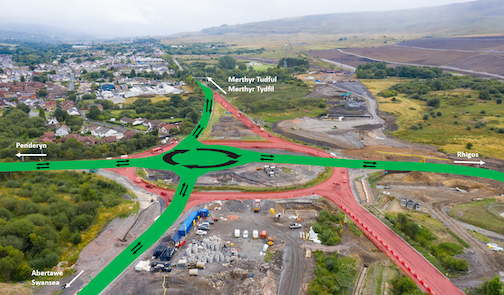Appeal judges back Welsh ministers over differences with planning policy in England on a site adjacent to the A465 at the Blaengwrach Roundabout, Glynneath,
Planning is a devolved function in Wales and so differences exist and are likely to grow between policy there and in England, the Court of Appeal has noted in a case in which it upheld an inspector’s ruling.
The case of Waterstone Estates Ltd v The Welsh Ministers [2018] EWCA Civ 1571 concerned a site adjacent to the A465 at the Blaengwrach Roundabout, Glynneath, part of which is currently used as a petrol filling station and two fast-food restaurants. The appellant developer, Waterstone, wishes to develop the site as a roadside service area.
Hickinbottom LJ, with whom Lord Justice Singh and Lord Justice Davis agreed, said the case concerned “a potentially important issue” as to whether, in relation to the approach to need in the consideration of a planning application for retail development outside settlement areas, national planning policy in Wales is substantively different from that in England, which the Welsh Ministers contended it was and Waterstone that it was not.
Neath Port Talbot Council had refused Waterstone’s planning applications and the developer appealed under section 78 of the Town and Country Planning Act 1990. This appeal was heard by inspector Janine Townsley, who found the proposal was contrary to policy being outside the settlement area and not containing any exceptional issues.
Waterstone then argued when it went to the High Court that its proposed development was infrastructure and could therefore be permitted.
Fraser J, who heard that case, said it was too late for Waterstone to bring in this point, which had not been raised before Ms Townsley and it would be “wholly perverse” to quash an inspector's decision on the basis of an error said to have occurred in an argument not ventilated before her.
Hickinbottom LJ said: “It is my firm view that the inspector did not err in not taking the [infrastructure] point herself.
“As frequently emphasised by both the Planning Court and this court, it is important that the burdens placed on planning decision makers are not inappropriately heavy. In my view, to impose on the inspector the legal obligation of taking this point herself would quite unreasonably expect too much of her.”
He said Fraser J had been right to decide that planning decisions in England on the sequential test for retail development were not relevant since policy in Wales was different.
Hickinbottom LJ added it was unsurprising that policy on the need for retail provision in Wales might differ from that in England, given its devolved status, and that these differences were likely to grow over time. “The Planning (Wales) Act 2015, section 3 of which inserts a new section 60 into the 2004 Act requiring the Welsh Ministers to prepare and publish a National Development Framework for Wales, is only likely to increase the pace of change in Wales.”
Mark Smulian


